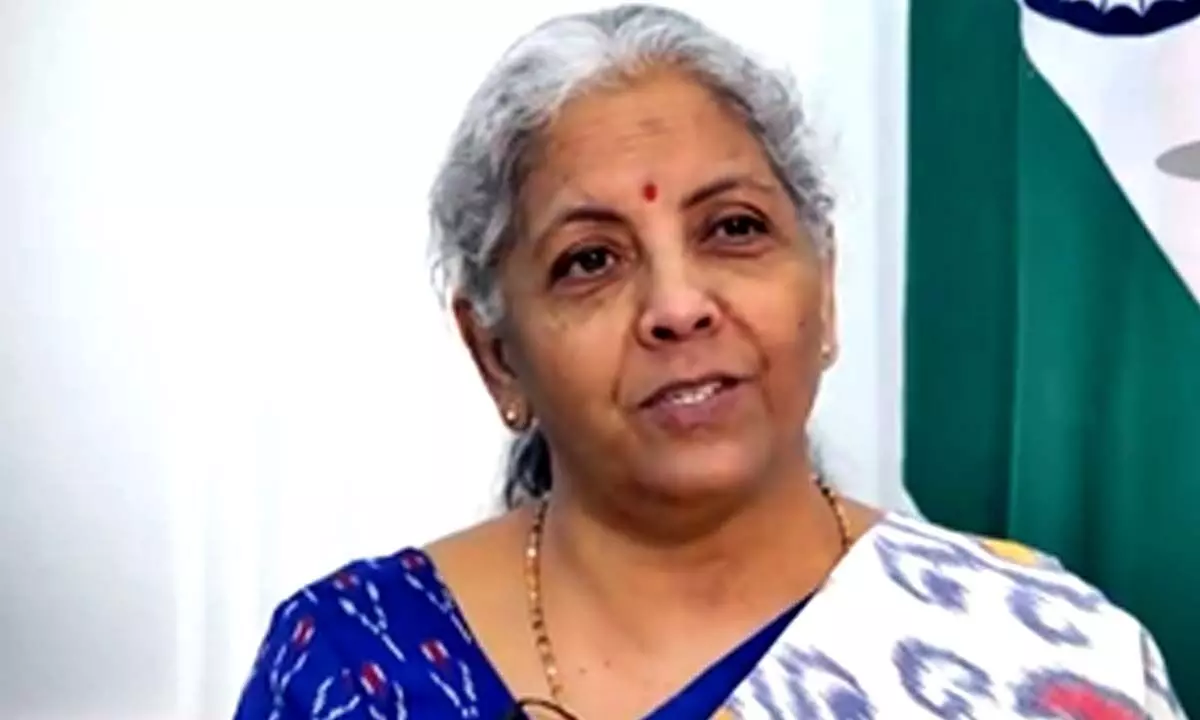Live
- They always want me to win, and now I feel lucky to have been offered a story like ‘Zebra’: Satyadev Kancharana
- ‘Democracy first, humanity first’: PM Modi in Guyana's parliament on two countries' similarities
- PKL Season 11: Telugu Titans register third straight win to top standings
- Is Pollution Contributing to Your COPD?
- NASA Unveils Underwater Robots for Exploring Jupiter's Moons
- Additional Central forces arrive in violence-hit Manipur
- AR Rahman and Saira Banu’s Divorce: Legal Insights into Common Issues in Bollywood Marriages
- 82.7 pc work completed in HPCL Rajasthan Refinery area: official
- Curfew relaxation extended in 5 Manipur districts on Friday
- Tab scam prompts Bengal govt to adopt caution over fund disbursement
Just In
FM Sitharaman reels out data to slam Congress for neglect of infra projects

Finance Minister Nirmala Sitharaman on Wednesday reeled out data to slam the erstwhile Congress-led United Progressive Alliance (UPA) government for having "wasted India's economic growth potential between 2004-14 and leaving it among the 'Fragile Five' economies without focusing on effective infrastructure development".
New Delhi: Finance Minister Nirmala Sitharaman on Wednesday reeled out data to slam the erstwhile Congress-led United Progressive Alliance (UPA) government for having "wasted India's economic growth potential between 2004-14 and leaving it among the 'Fragile Five' economies without focusing on effective infrastructure development".
She cited reports of the CAG, IMF and Cabinet Secretary to highlight the policy paralysis of the Congress-led government that led to inordinate delays in implementing projects in the highways, ports and railway sectors.
"Every km of road, every railway track, and every bridge built paves the way for a brighter and more prosperous future for all," she said.
"Under the UPA, almost all aspects of India's economic needs were mismanaged or ignored. The Congress-led UPA Govt’s noticeable and deliberate neglect of infrastructure creation not only denied India much-needed roads, railways, power, etc., but it also compromised India's long-term economic potential," the Finance Minister said in a post on X.
A more glaring outcome of this neglect was the development of border roads and defence capital expenditure, which left India vulnerable to external threats. Then Defence Minister AK Antony remarked in 2013, "an undeveloped border is safer than a developed border", Nirmala Sitharaman pointed out.
"In contrast, Prime Minister Narendra Modi firmly believes that the village on the border is not India’s last village, it is the country's first village. Through the 'Vibrant Villages Programme', we are developing the border villages and strengthening their infrastructure.
"The UPA government's term was replete with examples of decision stasis. Cost overruns, stalled projects and lack of timely approvals were common between 2004-14," FM Sitharaman said.
The Union Minister further said that the Cabinet Secretary noted in 2013 that "many large projects both in the public sector as well as the private sector, especially in infrastructure and manufacturing sectors, have been held up for investment on account of delays in obtaining various approvals/clearances".
She said that the IMF working paper (March 2014) highlighted three main reasons for the investment slowdown in India -- policy uncertainty, delayed project approvals, implementation and supply bottlenecks.
And, the Finance Minister, also referred to the CAG Report 2014 that stated "Railway Board took an average of 43 months to sanction rehabilitation of bridgeworks, and they were completed with an average delay of 41 months".
Nirmala Sitharaman said that in contrast, PM Modi's active role has made the infrastructure turnaround possible.
"PM Modi has personally monitored the progress of projects, even those launched earlier, through the PRAGATI platform. This led to the successful completion of long-delayed projects. Through 43 PRAGATI meetings, PM Modi has reviewed projects worth Rs 17.36 lakh crore," the Finance Minister said.
The Union Minister said that the share of capex in total expenditure dropped sharply under the UPA.
"From 23 per cent in 2003-04, it dropped quickly to an average of 12 per cent from 2005-2014. Imagine the opportunity cost lost due to the Congress-led government not investing adequately in capital expenditure," she added.
"Our government significantly increased the outlay for capex. As a proportion of total expenditure, capex rose to over 21 per cent in 2023-24, compared to just 12 per cent in 2013-14," the Finance Minister observed.
"Since 2014, our government has allocated a total of Rs 43.53 lakh crore in Gross Budgetary Support (GBS) capital expenditure, an increase of 3.72 times compared to 2004-14," she added.

© 2024 Hyderabad Media House Limited/The Hans India. All rights reserved. Powered by hocalwire.com






